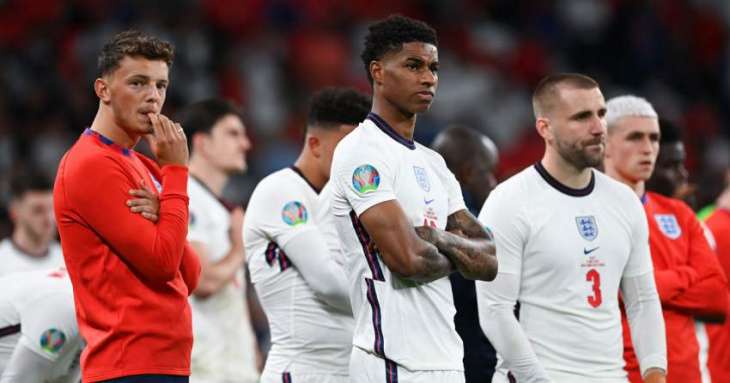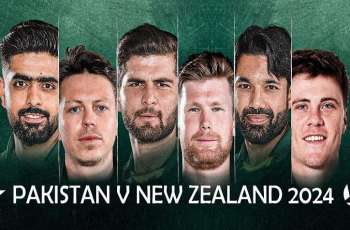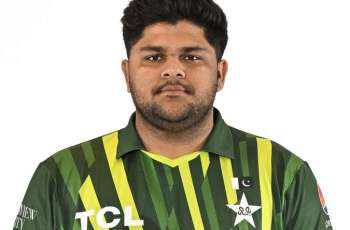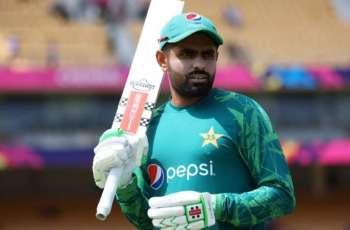The English men's national soccer team once again suffered heartbreak in a penalty shootout, as the side lost Sunday's EURO 2020 final on spot-kicks to Italy, but the nation has rushed to wrap its arms around three Black players who missed their penalties and were subsequently subjected to a barrage of racist abuse online
MOSCOW (Pakistan Point News / Sputnik - 16th July, 2021) The English men's national soccer team once again suffered heartbreak in a penalty shootout, as the side lost Sunday's EURO 2020 final on spot-kicks to Italy, but the nation has rushed to wrap its arms around three Black players who missed their penalties and were subsequently subjected to a barrage of racist abuse online.
Hopes were high in England that the men's national team could undo "55 years of hurt" and lead the country to its first major soccer title since the 1966 World Cup win.
A wave of optimism swept through the country as England defeated Germany, Ukraine, and Denmark in the knockout stages of the competition, led by the goal-scoring exploits of Manchester City star Raheem Sterling, who himself has been a target of the English tabloid press for years.
England got off to a dream start in Sunday's final, as Luke Shaw scored after just two minutes to send Wembley into raptures. Italy grew into the game equalizing through Leonardo Bonucci midway through the second half.
Neither team could find the breakthrough in extra time and the game went to penalties. In the shootout, Marcus Rashford, Jadon Sancho, and Bukayo Saka missed their penalties, handing Italy victory by the narrowest of margins.
In a matter of minutes, multiple accounts began posting comments containing monkey and banana emojis, as well as racist slurs, on the accounts of the three Black players who failed to score from the spot.
Twitter and Facebook said that they worked quickly to delete any racist comments and block the accounts sending the abuse, but Sunday's events are just a footnote to English football's racism problem, which spans back decades.
RACIST ABUSE CAME AS NO SURPRISE
Black soccer players have long been subjected to racist abuse in England. In the 1970s and 1980s, much of the abuse came from fans in the stands.
With the advent of social media, many Black players are now targeted on social media sites such as Facebook and Instagram.
This past winter, three Black Manchester United players, Rashford, Axel Tuanzebe, and Anthony Martial, Chelsea's Reece James, and West Bromwich Albion's Romaine Sawyers were bombarded with racist messages, prompting government officials such as Digital, Culture, Media and Sport Secretary Oliver Dowden to make a pledge to take greater action.
After Sunday's final, racist vandals also defaced a mural to Rashford, who led a campaign last year that forced the government to reverse its decision to scrap free school meals for underprivileged children during the summer holidays.
Natalie Elphicke, a Conservative lawmaker, appeared to mock Rashford following his penalty miss, commenting that the Manchester United forward "should have spent more time perfecting his game and less time playing politics."
In response, hundreds of fans left messages of support on the mural, which was also the site of a Stand Up to Racism vigil this past week.
At the vigil, a group of people was photographed "taking the knee," the anti-racism gesture conducted by England's soccer players before every game.
Large parts of English society may have rallied around the three Black players who were victims of racist abuse, but Josh Wilson, a producer, journalist, and campaigner, said that it was no surprise that England's Black soccer stars were targeted.
"[I'm] not even remotely surprised. In fact, I would have bet on it. Everyone I watched the game with - of varying ethnicities - also knew. I would not have expected people that resort to racism to have decorum and leave that characteristic element out of their assaults," Wilson told Sputnik.
This sentiment was shared by Paula Rhone-Adrien, a leading Black female barrister in the United Kingdom, who noted her own experience of racism in the workplace and on the streets of the country.
"Having suffered racist abuse in places of work, at social events and even just crossing the road, my experience of racism is that racists are everywhere, presenting in every walk of life and expressing their racist views without fear, while others look on or look away," Rhone-Adrien told Sputnik.
Wilson said that it was ironic that some England fans were so quick to turn on the team's Black players despite the success they had during EURO 2020, noting that Raheem Sterling was selected to the team of the tournament after scoring three goals.
The producer and campaigner also said that the latest incident was indicative of the arrogance that can be found in many corners of English society, which he linked to the UK's colonial heritage.
"The online racial assaults and the physical assaults that took place throughout society in the aftermath of the game highlight the mentality that unless an outstanding contribution to society is made, the fundamental right of respect and dignity is seen as forfeit to darker-skinned ethnic minorities across the UK, in this instance, Black people. The embedded colonial-era arrogance that the numerous vile messages portrayed signal that there's a complete lack of historical education in some pockets of society once again," Wilson remarked.
Wilson also criticized the findings of the Commission on Race and Ethnic Disparities' spring report, which alleged that there was "no evidence" of institutional racism in the United Kingdom.
Barrister Paula Rhone-Adrien asserted that English society is not in itself racist, but said that many people are unwilling to confront racist people or defend those who are victims of racism.
"English society certainly has an inherent problem with confronting the racists within their midst. I do not opine that English society is inherently racist, on the contrary when pushed, English society will rally against those with such abhorrent views. However, it is the inertia that exists for the majority of the time in society that permits the racists to become emboldened," she remarked.
The barrister said despite her many instances of suffering racist abuse, a member of the public had only come to her defense twice.
UK GOVERNMENT CRITICISM OF ANTI-RACISM GESTURE
The public backlash against the abuse faced by Rashford, Sancho, and Saka has seemingly brought about a change in rhetoric from the UK government, one that may have a significant impact on UK society.
During Wednesday's session of Prime Minister's Questions, Boris Johnson admitted in parliament that he thought "racism is a problem in the United Kingdom," adding that his government would take steps to tackle this issue.
However, Conservative lawmakers and ministers have been slammed for their long-standing criticism of the "taking the knee" gesture prior to Sunday's final.
Teams in the English Premier League first began "taking the knee" before games last summer, following the death of George Floyd in police custody in the United States.
Home Secretary Priti Patel described "taking the knee" as "dreadful" during a radio interview in February, and she slammed the anti-racism demonstration as a form of "gesture politics" ahead of EURO 2020.
Commenting on the "taking the knee" gesture during a similar radio interview on LBC on July 3, Johnson said, "I do not believe in gestures, I believe in substance."
Patel and Johnson both rushed to condemn the racist abuse sent to England's Black players following Sunday's final defeat against Italy, but Tyrone Mings, a member of the national team, slammed Conservative lawmakers for "stoking the fire" with their criticism of the anti-racism message.
"You don't get to stoke the fire at the beginning of the tournament by labeling our anti-racism message as 'Gesture Politics' & then pretend to be disgusted when the very thing we're campaigning against, happens," Mings said in a reply to Priti Patel on Twitter.
Barrister Paula Rhone-Adrien said that she stood fully in support of Mings's comments, criticized the government for its previous stance on tackling racism.
"I completely agree with what Mings has written. The government has done what most people do when we discuss racism: roll their eyes and suggest the person of color is being over sensitive and taking unnecessary action; blaming the victim for speaking out; criticizing the victim for seeking 'inappropriate help,' instead of sitting down with the victim to identify real and lasting solutions," she said.
This sentiment was shared by the producer and campaigner, Josh Wilson, who accused the home secretary of being a hypocrite when it comes to tackling racism.
"I applaud Mr. Mings for using his platform to point out the hypocrisy of Priti Patel. The complete lack of understanding of the lives of ethnic minorities in this country from our home secretary is absolutely astonishing to me," Wilson remarked.
Johnson and Patel should also be held accountable for their inability to confront the racism problem that faces UK society, Wilson added.
"Racism has been a massive problem, racism still is a massive problem and Ms. Patel and our prime minister should be held accountable for their self-serving and unempathetic style of leadership that has helped systemic and acute racism continue in the UK," the producer and campaigner said.
GOVERNMENT PROPOSES GETTING TOUGH ON SOCIAL MEDIA SITES
Speaking on Wednesday, Boris Johnson unveiled his plans to address the spread of racist messages online.
Firstly, the prime minister announced that all those found guilty of sending racist messages online to footballers would receive banning orders preventing them from attending games.
As of Thursday, five people in the UK have been arrested over the online racist abuse of Rashford, Sancho, and Saka.
Johnson added that he had been in contact with representatives from major social media sites, including Facebook, Instagram, and Snapchat, and said that the tech giants could face fines of up to 10% of their global revenues if they fail to delete racist content and ban the users responsible.
Saka, who plays for Arsenal, issued a statement on Thursday calling on social media networks to make a more concerted effort to tackle the issue of racist messages on their platforms.
"I don't want any child or adult to have to receive the hateful and hurtful messages that me, Marcus and Jadon have received this week. I knew instantly the kind of hate that I was about to receive and that is a sad reality that your powerful platforms are not doing enough to stop these messages," Saka wrote in the statement posted on Twitter.
Paula Rhone-Adrien said that sites such as Facebook and Instagram should expect to be sanctioned if they fail to delete racist abuse from their platforms.
"Perhaps if the social media companies sent emails reminding all members of the potential criminal liability if they behaved in such a way, and that it would report its users where such behavior was identified, then perhaps such users would understand that the platforms will not tolerate such behavior. As a society we need to act to stamp racism out, social media platforms carry this responsibility too," she said.
Josh Wilson said that social media companies could force users to submit photo ID when creating an account to ensure that any comments posted by the user could be traced back to a real person, adding that tech giants had a responsibility to do more.
"They can 100% do more. I think from their perspective it starts to become a slippery slope, so to speak, but ultimately it is their platform. Social media companies sanctioned Trump because his rhetoric was getting too out of hand. They must set a strong precedent for their own platform around users' actions. It is not for governments to set," Wilson said.
The English Premier League season is set to begin in mid-August, and after a year and a half of coronavirus-related disruption, the prime minister has given the green light for clubs to host games without capacity restrictions.
Audible boos could be heard at Wembley when the England players first took the knee at EURO 2020, and fans at several lower-league English clubs voiced their discontent over the gesture late last season.
For now, English football is left to pick up the pieces of yet another racism scandal, and it remains to be seen if the government will be able to take the action needed to confront this long-standing problem, both on and off the pitch.




